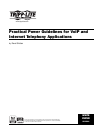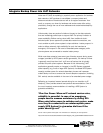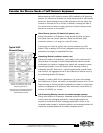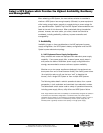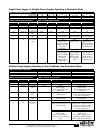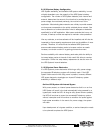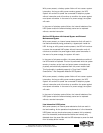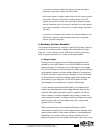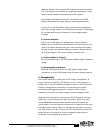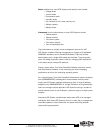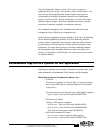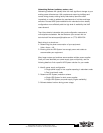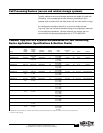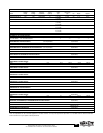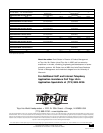
6
© 2008 TRIPP LITE. ALL RIGHTS RESERVED. THE POLICY OF TRIPP LITE IS ONE OF CONTINUOUS IMPROVEMENT.
SPECIFICATIONS ARE SUBJECT TO CHANGE WITHOUT NOTICE.
ALL TRADEMARKS ARE THE PROPERTY OF THEIR RESPECTIVE OWNERS.
B. UPS System Battery Configuration
UPS System availability, and therefore VoIP system availability, is most
critically dependent upon the capacity of the UPS System's battery
configuration. The number of UPS System batteries, both internal and
external, determines the amount of runtime that is provided during a
power outage. As mentioned previously, the runtime must fit the
application. Most existing data networks are unlikely to provide reserve
runtime power comparable to the public switched phone network. One
has to determine a runtime estimate of what is adequate or desirable
specifically for a VoIP application. Most users conclude that hours, not
minutes, of backup runtime are required to maintain voice operations.
Like any estimate, a runtime estimate will be imperfect and will also be
impacted by future capacity requirements (such as the addition of more
phones). Therefore, it is critical that the selected UPS System can
accommodate external battery packs to increase runtime as needs
increase, or maintain runtime in a growing phone environment.
Runtime scalability with external battery packs also yields the ability to
hot swap battery packs at the end of their useful life without a service
interruption. Similar hot swap battery replacement is also the norm for
the UPS System's internal batteries.
C. UPS System Power Electronics
If a UPS System's power electronics fail during a utility power outage,
the supported IP telephony system will obviously crash. If the UPS
System failure occurs while utility power is present, however, different
UPS power electronics topologies can impact IP telephony system
availability in different ways.
On-Line UPS System with Internal Bypass
With power present, an internal power electronics fault in an on-line
UPS System will result in the load automatically being powered by a
bypass path inside the UPS. As long as utility power remains present,
the UPS will continue to power the connected IP telephony system
without interruption and will continue to condition the power against
basic power anomalies. In the event of a power outage, the system
will crash.
Upon development of a bypass condition, a service interruption needs
to be planned to replace the UPS System.



